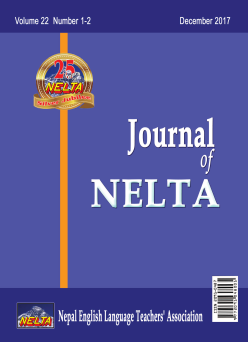The Relationship between Reading Strategy Use and EFL Test Performance
DOI:
https://doi.org/10.3126/nelta.v22i1-2.20040Keywords:
English as a foreign language, Cognitive reading strategy, Metacognitive reading strategy, ProficiencyAbstract
There has been a steady interest in investigating the relationship between strategy use and English as a foreign language (EFL) test performance. Despite numerous studies on strategy use, the relationship between the two is still not clear. This paper reports on a study that investigated the use of reading strategies in the Secondary Education Examination English reading test and the relationship between reading strategy use and the test performance. A sample of 312 EFL learners studying at Grade 10 in Nepal participated in this study. They were asked to take the test and then respond to a reading strategy questionnaire. The quantitative software SPSS (version 20) was used to analyze the data. The results indicated that participants were active strategy users, and they used cognitive strategies more frequently than metacognitive strategies. A significant relationship was identified between reading strategy use and EFL proficiency; high-proficiency learners reported significantly higher use of reading strategies than moderate-proficiency learners, who in turn reported higher use of those strategies than their low-proficiency peers. Implications of these findings for EFL teaching and recommendations for further research are discussed.
Journal of NELTA , Vol. 22, No. 1-2, 2017 December, Page: 39-52
Downloads
Downloads
Published
How to Cite
Issue
Section
License
© Nepal English Language Teachers’ Association (NELTA)
Authors are required to transfer their copyright to the Nepal English Language Teachers' Association (NELTA)
The Journal of NELTA is copyright by Nepal English Language Teachers’ Association (NELTA). Apart from citing/referencing in academic works, no part of any materials may be reproduced by any process without prior written permission from its copyright owner – NELTA. Requests and enquiries concerning reproduction and rights may be addressed to NELTA or the editorial board at neltaeditorialboard@gmail.com.




